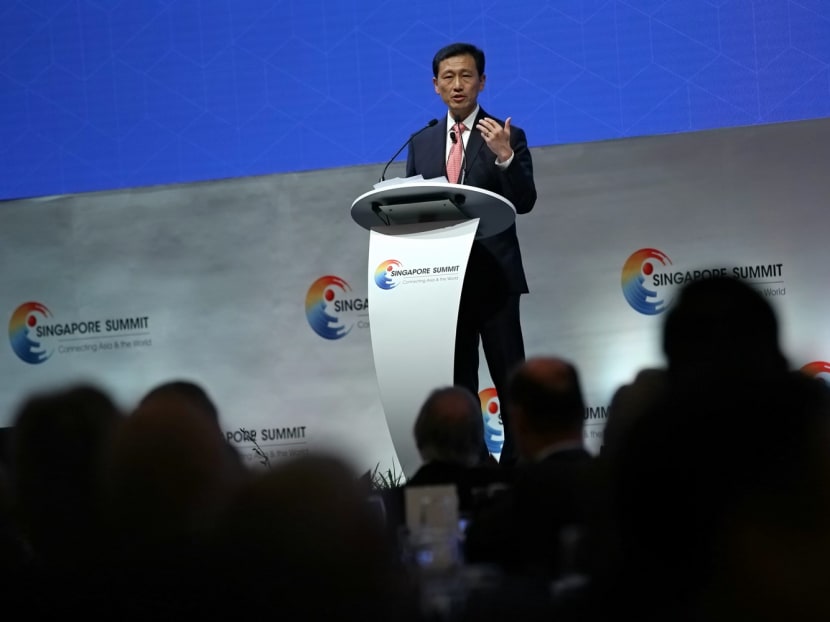Building for the long term is the only way Singapore can survive and thrive: Ong Ye Kung
SINGAPORE — Apart from embarking on a major economic shift, the Government is "remaking" Singapore in several ways over the next 20 to 30 years or more — including areas such as education, infrastructure and housing, as well as support for an ageing population.

Speaking at the Singapore Summit on Friday (Sept 14), Education Minister Ong Ye Kung outlined the Government's blueprint for the coming decades.
SINGAPORE — Apart from embarking on a major economic shift, the Government is "remaking" Singapore in several ways over the next 20 to 30 years or more, in areas such as education, infrastructure and housing, as well as support for an ageing population.
Speaking on Friday (Sept 14) at the Singapore Summit, a conference for business and thought leaders to discuss business and global affairs, Education Minister Ong Ye Kung outlined the Government's blueprint for the coming decades, as he stressed the need for long-term planning despite global politics changing from being "an art of a long-term search for the better life, to an auction for short-term euphoria".
While Foreign Direct Investment (FDI) remains important, Mr Ong said that it is “no longer sufficient”. FDI, which has been a major part of Singapore’s growth model, is an investment in which a foreign direct investor owns 10 per cent or more of the ordinary shares in a Singapore enterprise.
Given Singapore’s maturing economy and that it is "already pushing the limits of (its) land and manpower resources”, the nation has to move to the next phase of economic development. This means embracing innovation, developing new products and services, as well as nurturing Singapore-based enterprises to venture into the region and take advantage of potential growth markets.
Mr Ong said: “So, from making things to creating things, from bringing in FDI to venturing out to the world. It is a major shift in economic strategy.”
To support that vision, the Government has been attracting and “patiently investing” in research-and-development centres, he noted. This is in addition to having world-class universities, one of the top intellectual property regimes in the world, as well as a well-regulated yet business-friendly environment.
When it comes to infrastructure, the Government is building ahead of demand, as it is set to double airport and seaport capacities. It will construct the new Terminal 5, which is expected to start operations in 2030, and the Tuas mega port will be completed by 2040.
Touching on Housing and Development Board (HDB) flats, Mr Ong said the Government “cannot allow entire residential towns to become old and run down”, as this will reduce quality of life, segregate the population, and drive down home prices.
That is why the Government will expand the Home Improvement Programme — first announced at this year's National Day Rally — so that HDB flats can be upgraded twice during their 99-year lease period, he added.
Under the new Voluntary Early Redevelopment Scheme (Vers), owners have the option of cashing out when their flats reach 70 years or beyond, and use the sales proceeds to fund their next purchase, probably at a subsidised rate.
Turning to the issue of Singapore’s ageing population, Mr Ong said there are policies in place, such as raising the retirement age and introducing legislation on re-employment, to help older Singaporeans work longer should they want to do so.
On the healthcare front, the Government is building more acute and community hospitals, as well as eldercare centres.
With healthcare expenditure expected to grow, Mr Ong noted that it could overtake education spending in the next few years. For now, healthcare is the third highest area of Government expenditure after defence and education.
PLANNING AHEAD
Changes are also afoot in the education system, with less emphasis on grades and more on lifelong learning, said Mr Ong. He added that there is still “a lot of work to do”, such as moving “even further away” from rigorous academic teaching towards applied learning and critical thinking, among others.
Mr Ong’s comments came at a time this week when there is some discussion on whether the Government is making policy promises too far into the future.
In a letter to TODAY, Mr Devadas Krishnadas, a former civil servant who is now the chief executive officer of management consultancy Future-Moves Group, said there is an embedded assumption that the ruling government will stay in power. He wrote that “it is taken for granted that such advanced future policy promises are as good as present policy promises”.
He cited as an example of future policy the Vers scheme, which aims to redevelop public housing estates in about 20 years.
Mr Devadas noted that indulging a political incumbent with its expectation of longevity in office risks “breeding complacency, arrogance and a sense of entitlement”.
In response, some TODAY readers argued that it is important for Singapore to plan ahead, prompting Mr Devadas to respond that long-term planning does not mean committing a future government to heavy spending.
In his speech, Mr Ong noted that planning long term will prepare Singapore for the evolving global landscape, and ensure the nation remains at the forefront of competition.
Singapore has to remain on this track despite global changes that have seen politics and governance becoming “more short-term and populist”, he added.
He said: “It is hard to explain this trend. Perhaps social media is breeding more angst and impatience among people. Perhaps online falsehoods are dividing societies, and creating national security issues.
“But in Singapore, we have chosen to keep our orientation firmly towards building for the long term. It is the only way that a small state can survive and do well.”






